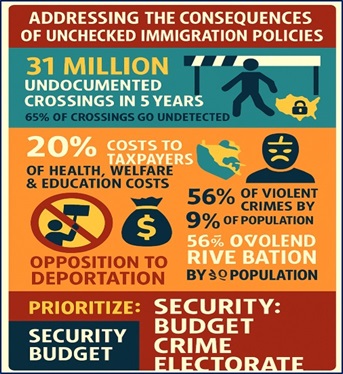Addressing the Consequences of Unchecked Immigration Policies
Posted on June 10th, 2025
Prof. Sunil Wimalawansa

The United States (USA) currently faces one of its most critical challenges: the unchecked influx of undocumented individuals across its northern and southern borders. Over the past few years, an estimated 31 million undocumented people have entered the country, a figure significantly higher than the official “catch and release” numbers reported by the current administration, which stand at approximately 13 million.
According to the Department of Border Patrol (CBP), over 65% of border crossings (borders extending thousands of miles) go undetected, underscoring serious gaps in border security and immigration enforcement. Furthermore, intelligence reports have raised concerns that adversarial nations have exploited this porous border by sending an estimated two million individuals with criminal backgrounds and an additional one million military-age men for espionage and destabilization efforts within the United States. This is the 21st century―there is no safe and sovereign nation without secure borders.
The fiscal impact of this demographic shift is substantial. Roughly 20% of the nation’s healthcare (including Medicaid), welfare, and public education budgets are allocated to serving undocumented populations. These are hardly discussed in the mainstream media, but exaggerate how sinful deportations are. These expenses place a heavy burden on taxpayers and contribute to rising costs of living nationwide, as well as a disturbing rise in violent crime. Although undocumented immigrants represent less than 10% of the total U.S. population, recent data attribute 56% of violent crimes to this group. Such statistics illustrate profound implications for national security, public safety, and social cohesion.
The growing public concern is often met with resistance by certain factions who oppose deportation efforts. These groups—comprising activists, politicians, billionaire donors to disrupt society, and others—organize protests, as happened in Los Angeles last weekend, to prevent the arrest of violent criminals, engage in legal challenges, and even obstruct enforcement through judicial activism by a handful of ideologically motivated federal judges with lifetime tenure.
These obstructions to arresting and deporting known violent offenders compound the risks to community safety and, eventually, the sovereignty of the USA. Those who vehemently oppose deportation (many paid to do so) should, at a minimum, be made to bear the responsibility for housing and financially supporting them, and formally making them pay for the victims of crimes. An official legal approach is warranted for them if they do not want to deport criminal invaders, those trespassers with criminal records, rather than shifting these costs onto the general population.
The persistence of this crisis cannot be justified on social, economic, or security grounds. Alarmingly, many experts view it as a deliberate political strategy aimed at altering the electorate. By granting de facto citizenship (and driver’s licenses) and voting rights through backdoor mechanisms—as observed in states like California—political factions seek to secure a long-term voter base, thus perpetuating their hold on power at the expense of the nation’s stability.
Sri Lanka, as a smaller island nation with distinct cultural and social dynamics, must heed these lessons. Current proposals to allow visa-free access for South Indians in the northern regions and to resettle foreign populations in eastern provinces (already happening at a smaller scale) carry serious risks of repeating similar mistakes as in the USA. These measures threaten national identity and sovereignty, cultural heritage, enhance the economic downturn, and social harmony. For example, prior government decisions to relocate Maldivian nationals and some Bangladeshis brought in. They settled in the eastern regions of the NCP—under the guise of environmental concerns—but driven mainly by political interests—and have already contributed to rising social tensions, violence, and unrest in the mentioned region.
Sri Lanka’s leadership must undertake a comprehensive assessment of the long-term consequences of immigration and population resettlement policies. Stop favoring ethnic minorities for short-term political gain that ends the harmony and peace within the nation. Prioritizing national unity, preserving cultural traditions, maintaining social stability, and safeguarding sovereignty should be paramount objectives. Failure to act decisively could lead to divisions and disruptions akin to those currently seen in the United States, jeopardizing the nation’s future peace and prosperity.